Report of the 4th Indian Ocean Conference – IOC 2019
03-04 September 2019
Maldives
The 4th Indian Ocean Conference – IOC 2019 was organised by India Foundation in association with the Foreign Service Institute of Maldives (FOSIM), and S Rajaratnam School of International Studies (RSIS), Singapore on September 3-4, 2019 in the Maldives. The theme for this edition of the Conference was “Securing the Indian Ocean Region: Traditional and Non-Traditional Challenges”.
The Conference was addressed by speakers from over 36 countries including Ministers from 17 countries, and Officials from 15 countries and was attended by delegates from over 40 countries.
First Day of the Conference started with parallel discussions on sub-themes of Navigational Security, Terrorism and Marine Ecology. The first symposium on Navigational Security was Chaired by Capt (IN) Alok Bansal, Director, India Foundation. The speakers were Dr Sanjaya Baru, Distinguished Fellow, Institute for Defence Studies and Analysis, India; Vice Admiral Anup Singh, Former C-inC, Eastern Naval Command, Indian Navy; Phil Midland, Former Naval Officer, USA and J B Vowell, Deputy Director, Planning and Policy, Indo-Pacific Command, USA
The second parallel symposium on Terrorism was Chaired by Prof S D Muni, Professor (Emeritus), School of International Studies, JNU. The session was addressed by Ms Prabha Rao, Executive Director, South Asian Institute for Strategic Affairs (SAISA), India; Admiral Jayantha Perera, Admiral, I M F and Former Commander of the Sri Lankan Navy; Lt Gen Syed Ata Hasnain, Former GOC, 15 and 21 Corps, Indian Army and Dr Klaus Lange, Director, Institute of Transnational Studies, Germany
The next two parallel sessions were on Navigational Security and an Ambassadors’ Panel to discuss the developments in IOR. The session on Navigational Security was Chaired Dr C Raja Mohan, Director, Institute of South Asian Studies, Singapore and was addressed by Ms Preeti Saran, Former Secretary (East), Ministry of External Affairs, India; Ms Nisha Biswal, President, US India Business Council, USA; Dr Yan Yan, Director, Research Center of Oceans Law and Policy, National Institute for the South China Sea Studies, China and Mr Sinderpal Singh, Senior Fellow and Coordinator of the South Asia Programme, Institute of Defence and Security Studies, RSIS, Singapore.
The Ambassador’s Panel was chaired by Mr Rajiv Sikri, Former Ambassador of India. The Panel was also addressed by Amb Shin Bong-Kil, Ambassador of South Korea to India; Amb Rita Giuliana Mannella, Ambassador of Italy to Sri Lanka; Amb Vicente Vivencio T. Bandillo, Ambassador of Philippines to Bangladesh and Amb Southam Sakonniyom, Former Ambassador of Lao PDR to India.
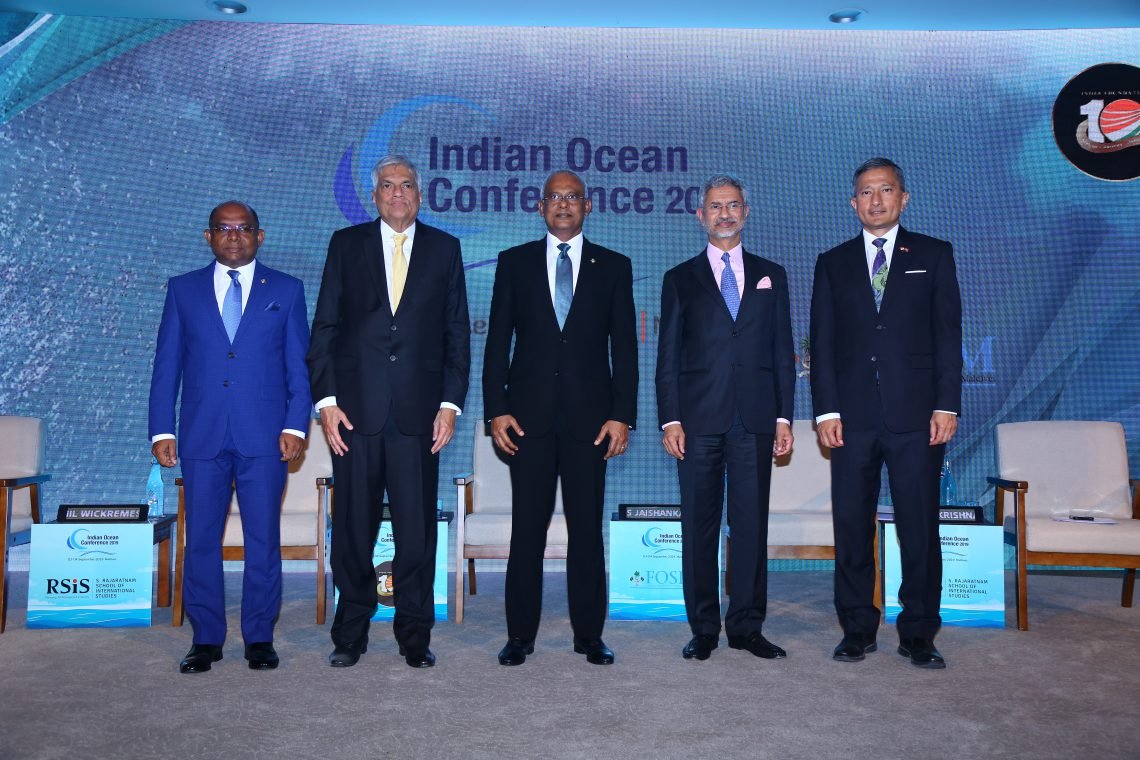
Inaugural session of the 4th Indian Ocean Conference
Inaugural Session
The Inaugural Session of the Conference was addressed by H.E. Ibrahim Mohamed Solih, President of Maldives; H.E. Ranil Wickremesinghe, Prime Minister, Sri Lanka; Dr Vivian Balakrishnan, Minister for Foreign Affairs, Singapore; Dr S Jaishankar, External Affairs Minister of India and Abdulla Shahid, Foreign Minister of Maldives.
Dr S Jaishankar, External Affairs Minister of India delivered the Welcome Address at the Inaugural Session of the Conference.
Addressing the Inaugural Session of the Conference, H.E Ibrahim Mohamed Solih, President of Maldives, spoke of the importance of navigational security to the security and well being of the Maldives. He then spoke of preserving the integrity and diversity of marine ecology as another crucial priority area for the collective security of the region. Particularly alarming for the Maldives has been a steep decline in the Indian Ocean’s fish stocks. He concluded by reiterating the commitment of his government to engage proactively on every single one of the substantial policy issues relevant to the Indian Ocean.
H.E. Ranil Wickremesinghe, Prime Minister, Sri Lanka commenced his address by highlighting that the world is becoming increasingly uncertain and facing a triad of critical threats. Amongst these, one of the most critical is the possibility of the downturn of the global economy since the financial crisis. The global dynamics are shifting, and the rise of new powers is creating an asymmetric bipolar world with US and China leading these tensions. With the increasing competition amongst many players, maritime players need to realize the risk associated with destabilizing the maritime order as there is binding economic order that necessitates a greater degree of restraint and cooperation.
Recalling the first edition of the Conference in 2016 Dr Vivian Balakrishnan, Minister for Foreign Affairs of Singapore said that, then there were already signs of fraying of the existing international order. The collective commitment to international security and multilateralism had started to waiver and to add to this the ongoing evolution of the 4th Industrial revolution and the changes it has demanded of our citizens poses greater challenges. He concluded by saying that we all want an India Ocean built on Peace, Security, Stability and Security. It has remained committed to facilitating dialogue, building trust and strengthening multilateral institutions.
Abdulla Shahid, Foreign Minister of Maldives delivered the Vote of Thanks and expressed gratitude on behalf of the Organising Committee of IOC 2019, towards all Heads of States, Ministers, Officials, Scholars and all other dignitaries for having graciously accepted the invite and attended the Conference.
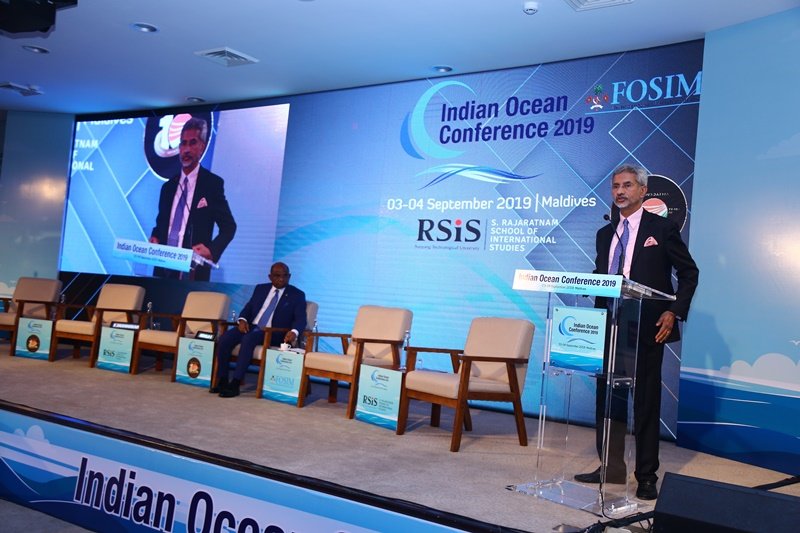
Keynote Session addressed by Dr S. Jaishankar, External Affairs Minister, India and Mr Abdulla Shahid, Foreign Minister, Maldives.
Conference Keynote Session
The Conference Keynote Session was addressed by Dr S. Jaishankar, External Affairs Minister, India and Abdulla Shahid, Foreign Minister, Maldives
Delivering the Conference KeynoteAddress Dr S Jaishankar reaffirmed that India will no longer be limited in the pursuit of its interest to its immediate neighbourhood. And, the same is being reflected in the forging of security relationships in the Pacific that parallel growing economic engagement. He conceptually justified India’s expanding interest in the region by highlighting that India’s core-interests lie in the Indian Ocean and thus a presence beyond also contributes to ensuring a peaceful periphery. Talking about the SAGAR vision, he drew attention to the fact that, SAGAR derives a more active and outcome-oriented Indian approach that enhances this influence by delivering on partnerships.
Taking the stage to address the Conference Keynote Session, Foreign Minister of Maldives, Shri Abdulla Shahid spoke of the geostrategic significance of the Indian Ocean Region and the need to protect and uphold the rule of law. He then elaborated on the Foreign Policy vision of President Ibrahim Mohammad Solih’s Government which seeks to cultivate healthy and mutually beneficial partnerships with all its neighbours and security in the Indian Ocean. The Maldives is thus working towards the safety, stability and security of the Indo-Pacific Region and towards ensuring Freedom of Navigation, Maritime Security and addressing the hindrances to that freedom including piracy and organised crime.
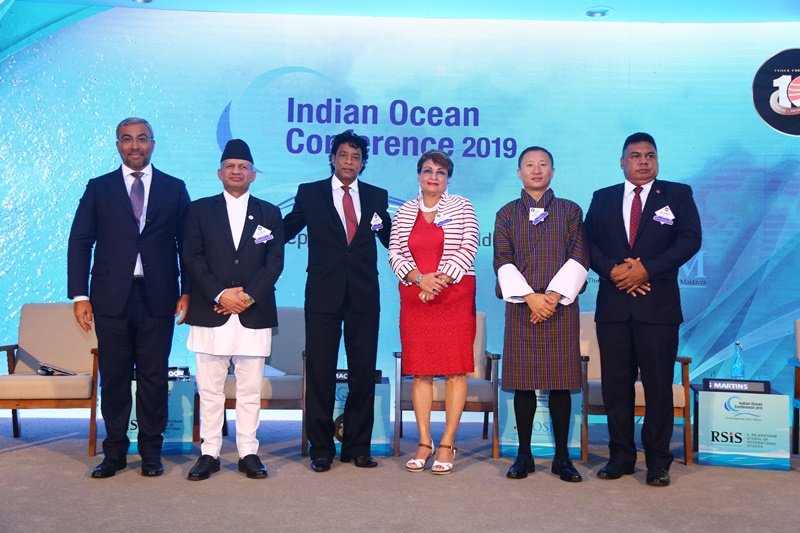
Session 1 being addressed by the Cabinet Ministers of six countries.
Session 1
The first Plenary Session of the Conference was addressed by Cabinet Ministers of Seychelles; Mauritius; Bhutan; Nepal; UAE and Timor Leste.
The Designated Minister from Seychelles, Macsuzy Mondon began her address by emphasising on the importance of the blue economy for the states surrounding the Indian Ocean Region (IOR). She outlined the importance of peace and stability in the IOR for its surrounding states. With opportunities come threats, such as piracy, trafficking and terrorism that destabilise the region. Thanking India and the USA for lending support to Seychelles, she called upon the global community for a joint effort to stabilise the region. This could be in the form of multilateral agreements and continued vigilance.
Nandcoomar Bodha, Minister of Foreign Affairs, Regional Integration and International Trade, Mauritius spoke about the significant challenges posed by piracy and terrorism in IOR. A comment was made on the recent freeing of convicted pirates from Somalia’s prisons, a major signal that the threat of piracy remains. With the crucial trade passing through the IOR, it is vital to protect the region against challenges such as trafficking, piracy, smuggling, and terrorism (etc.). The speaker concluded his speech by reiterating the importance of the IOR in being a bridge between Asia and Africa and the need to protect it.
The Minister for Foreign Affairs, Royal Government of Bhutan, Tandi Dorji, began his address by highlighting the cordial and fruitful relationship that Bhutan and the Maldives share. While Bhutan is landlocked, what happens in the IOR does have a significant impact on the nation due to the interconnectedness of the world today. While states face rising sea levels, Bhutan faces threats from melting glaciers that threaten lower-lying regions in the country. The effects of climate change are seen in Bhutan and the need for a concerted global effort is highlighted. To protect trade in the IOR and sustain the benefits of a blue economy, dialogue and collaboration are needed, with such conferences being a necessary first step.
Talking about the theme of the Conference, Pradeep Kumar Gyawali, Minister for Foreign Affairs, Nepal said that Nepal sees this as an apt and critical challenge to address. With relevance in development, biodiversity and vast resources, the ocean is vital for each nation in the region, even Nepal. Climate change is something that also affects Nepal, even though it is landlocked. Further, a multilateral approach is needed to tackle security challenges such as smuggling and trafficking. With the proposed construction of roads and waterways between Nepal and the Indian Ocean, Nepal hopes to have greater involvement in matters about the IOR.
Ahmad Ali Al Sayegh, Minister for Economic Cooperation in the Ministry of Foreign Affairs, UAE stated that freedom of navigation and regional cooperation is key to the growth of the ocean, continuing cultural exchanges and continuous trade movement. With the advent of climate change threatening all nations, there is a need to support global dialogues that catalyse climate action. A strong focus on vital issues such as maritime safety and security, cultural exchanges and the blue economy is needed with the help of several countries to continue building bridges and securing the region.
Joaquim Jose Gusmao dos Reis Martines, Minister of Agriculture and Fisheries, Timor Leste discussed the need to engage all partners to great cooperation and responsibility in the region, committing itself to the sustainable development of the blue economy following international law. Through partnership and support, there is a need to address unregulated fishing and developing sea-based tourism in the region, especially in tourism.
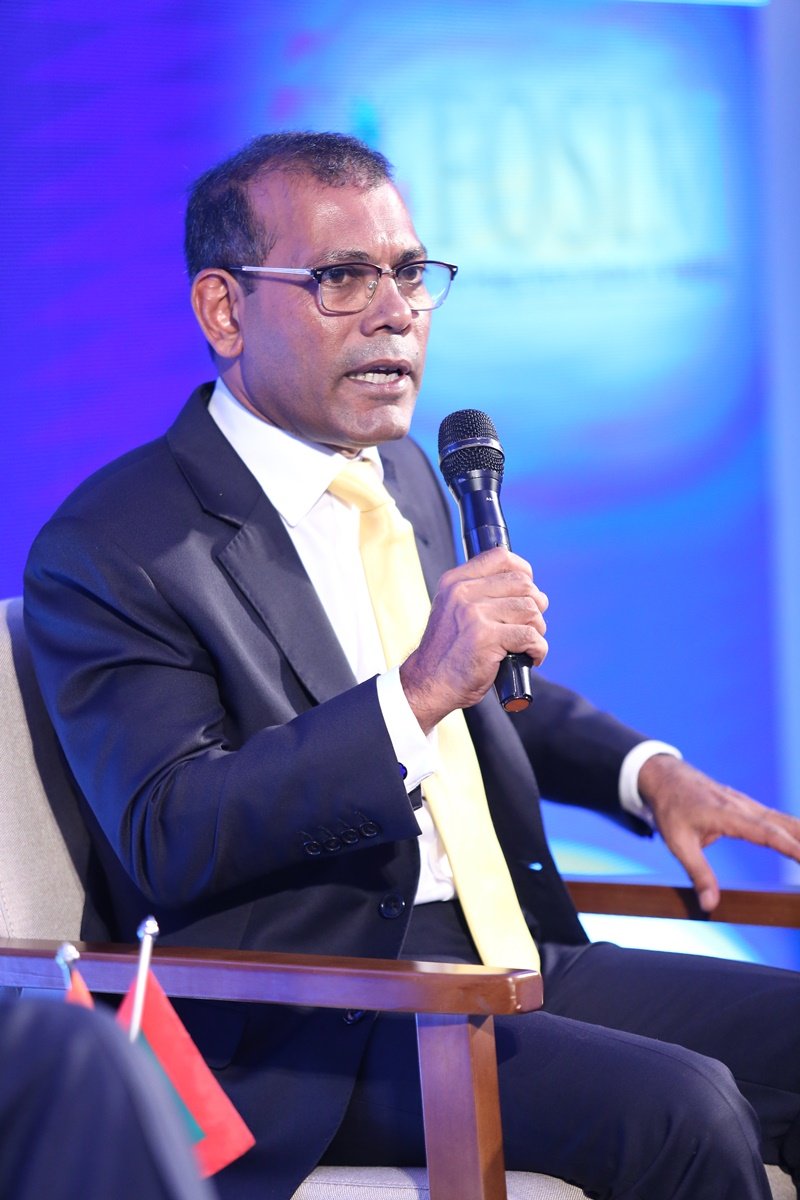
Keynote address being delivered by Md Nasheed, Speaker, Peoples’ Majlis, Maldives.
Day 2
Keynote Session II
The Second Keynote Session of the Conference was Chaired by M J Akbar, Member of Parliament, India and Md Nasheed, Speaker, Peoples’ Majlis, Maldives.
M J Akbar, Member of Parliament, India began his talk by diving straight into the history of the ocean. In his address, he stated that with climate change, increased militarisation and globalisation, it is imperative to ensure the safety of the Indian Ocean region. He also stated the importance of the Indo-pacific theatre during WW2, he reiterated the importance of the ocean to global affairs, then and now.
Mohammed Nasheed referenced the history of the IOR, stating the interest of Chinese and later European forces of establishing control over the ocean and their specific interest in surveying the islands of Maldives. While India has maintained a peaceful and strong relationship with the Maldives, he references the issue of land grabs and authoritarian rule in the region as a grave threat. Explicitly stating “I am specifically referring to China,” he outlined land grabs and debt diplomacy that the Chinese have used to gain control of the Maldives. He hopes for a more transparent and mutually beneficial investment in the Maldives from all nations in the region, comparing China to the East India Company. He also discussed the rise of radical Islam that threatens the Maldives and wider region.
Session II
Chair: Ram Madhav, National General Secretary, Bharatiya Janata Party; Member, Board of Governors, India Foundation
In a special video message, Lisa Curtis, Deputy Assistant to the President, Senior Director for South and Central Asia, National Security Council, USA, highlighted the long term threat from other malign actors who seek to undermine rather than uphold the rules based international order, seek to destabilize the region and reorder it towards their exclusive advantage. She focused on the Indo-Pacific priority of America to realize the goal of strong, sovereign and prosperous nations in the region.
Sayyid Badr bin Hamad Bin Hamood Albusaidi, Secretary-General, Ministry of Foreign Affairs, Oman focused his remarks specifically on maritime security in the region, built on the foundations of law and operational security. With piracy being a significant issue in the region, the Minister called for a collaborative effort in policing the sea. Cooperation entails the coordination of naval operations, information sharing and joint training. With trust-building and respect for maritime law, he hopes that states will prioritise long term peace and stability as opposed to short term gain.
Shahriar Alam, Minister of State for Foreign Affairs, Bangladesh stated that Bangladesh, a booming economy, has kept a strong interest and effort in maintaining peace and security in the Bay of Bengal and the Indian Ocean. With peace and stability in the region, all can take part in prosperous growth. He calls for greater economic integration and coastal shipping agreements to enhance regional connectivity. With “zero-tolerance” to illicit activities in the ocean, he hopes for further strategic partnerships and a security architecture to address the issue. Highlighting the importance of sustainable fishing and the threat of climate change, he called for greater conservation efforts from all nations in the region.
Chhiv Yiseang, Secretary of State, Ministry of Foreign Affairs & International Cooperation, Kingdom of Cambodia stressed the importance of cooperation in enhancing maritime security in the region, premised on strategic trust among nations. He called for a mutually beneficial framework where the interests of both large and small nations are respected. He outlined the importance of ASEAN in being a forum and “security shell” for its member nations to expand connections. He also stressed the importance of RCEP as being the key economic pillar of the region.
Session III
Chair: Ram Madhav, National General Secretary, Bharatiya Janata Party; Member, Board of Governors, India Foundation
Kyaw Myo, Deputy Minister of the Ministry of Transport and Communications, Myanmar, stressed the importance of cooperation through bilateral and multilateral settings to address regional issues. With the ever-increasing importance of the region and Myanmar’s strategic location, Myanmar hopes for a greater role on the part of all states in the region. He hopes for the development of “institutionalised cross-regional setting” for integration to tackle marine pollution and terrorism in the region. He stated that Myanmar hopes for peace and harmony in the region and hopes to play a larger role in the future.
Presenting the Japanese perspective, Toshiko Abe, State Minister of Foreign Affairs, Japan, reflected on the strategic importance due to the important sea line of communications. The Indian Ocean region is also the theatre of economic activity for many players. Hence, it faces challenges of both economic and security nature. In the context of the Indian Ocean, the Japanese focus is essentially on three factors, namely, the maritime order, combating piracy and combating terrorism. She focused on the importance of a rule-based free and open order for stability and prosperity.
Ronny Prasetyo Yuliantoro, Deputy Minister for Foreign Affairs and Special Advisor to the Foreign Minister on Inter-Institutional Relations, Indonesia stated that he hopes for greater confidence and soft cooperation through dialogue between nations in the region. In a growing economy, ASEAN can play a major role in bringing regional cooperation. The East Asia Summit can further bring economic and maritime cooperation, promoting connectivity and sustainability. With the sustainable development of the blue economy, Indonesia hopes for mutually beneficial growth and prosperity in the region.
Session IV
Chair: Shakti Sinha, Director, Nehru Memorial Museum and Library, India
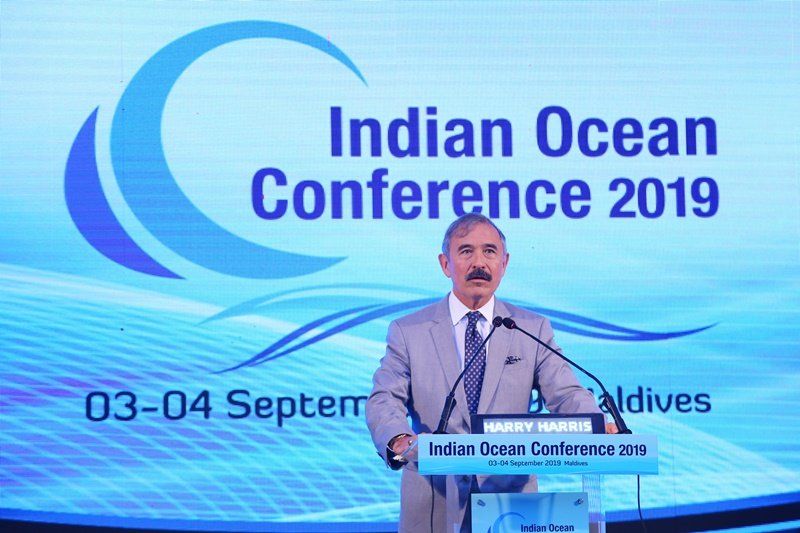
Ambassador Harry Harris, US Ambassador to South Korea delivering his address.
Harry Harris, the American Ambassador to South Korea and Former Commander of United States Pacific Command, regarded Indian and the Pacific Ocean as the two determinants of the future of the earth. He mentioned the US contribution and the robust manifestation of US to the economic momentum in the region. He highlighted the focus of Trump administration on the creation of strong reciprocal bilateral trade relations that contribute to development through job creations and not debt creation. He advocated for a free and open Indo-Pacific, with states to be strongly independent and be satellites to none in economic, security and governance terms. He also raised concerns over China’s commitment in the region.
Speaking on behalf of the Russian Federation, Yuri Materiy, Extraordinary and Plenipotentiary Ambassador of Russia to the Democratic Socialist Republic of Sri Lanka and The Maldives highlighted the Russian interest in the Indian Ocean Region as mentioned in the Maritime Doctrine of 2020. He regarded the Shanghai Cooperation Operation as a potential multilateral dialogue form for concerns in the Indian Ocean with the recent additions in its memberships. He also questioned the substance value of “Indo-Pacific”, while focusing on “Asia-Pacific” as reflective of a constructive partnership and cooperation.
Wei Hongtian, the Ambassador of Department of Boundary and Ocean Affairs, Ministry of Foreign Affairs, China, commenced his address by stating the Chinese ambitions to be a strong maritime country based on four principles, namely, peaceful, cooperative, open and win-win development; settlement of maritime dispute through friendly dialogue and negotiation; commitment to maritime cooperation and rules; upholding unobstructed passage and security of international shipping lines. On behalf of China, he proposed a justified reasonable openness of Indian Ocean Region with the participation of all based on negotiations. He regarded BRI to be one such forum for pragmatic cooperation.
Session V
Chair: Shakti Sinha, Director, Nehru Memorial Museum and Library, India
Describing old challenges as common knowledge, Pornpimol Kanchanalak, Adviser to Foreign Minister, Kingdom of Thailand, summarized new challenges to be rooted in the differences between the new great powers and the old international paradigm. She focused on the new Indo-Pacific outlook forwarded by Thailand as the current chair of ASEAN – to move away from confrontation towards constructive cooperation and working together to find some, if not all the solutions with an open mind.
M Shahidul Islam, Secretary-General, BIMSTEC Secretariat, focused his address majorly on the issues in Bay of Bengal and the littoral and adjacent states of BIMSTEC. The Bay of Bengal hosts key transit route between the Indian and the Pacific Ocean, thus becomes crucial in terms of security and strategic concerns of the larger Indian Ocean Region. Recognizing the need for a rule-based order supported by maritime infrastructures, he appreciated the awareness amongst the BIMSTEC states to work closely in developing common perceptions and approach towards them.
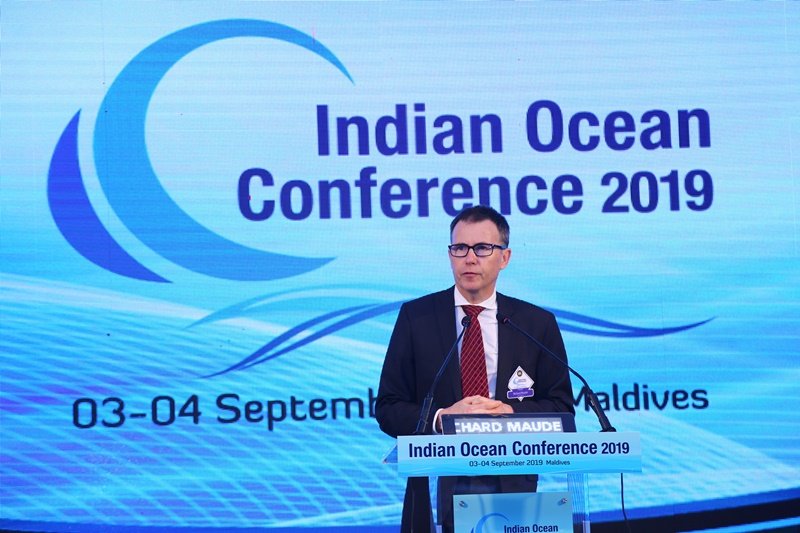
Richard Maude, Deputy Secretary, Department of Foreign Affairs and Trade, Australia addressing the delegates.
Richard Maude, Deputy Secretary, Indo-Pacific Group, Department of Foreign Affairs and Trade, Australia focused his address on the changing strategic dynamics in the region, the response of region particularly on the regional architecture and contribution of Australia in the region. He highlighted the manifestation of the changing dynamics through the creation of multipolarity in the region; flashpoints in border disputes; and gaining prominence of ‘geo-economics’, where trade, investment and infrastructure are being used not only for connectivity but also to build influence to secure political and economic gains.
Discussing the great strategic importance of the Indian Ocean, Nguyen Van Thao, Assistant to Deputy Prime Minister, Director General of the Department of Economic Affairs, Ministry of Foreign Affairs, Vietnam, attributed this importance to connectivity, oil shipment, shipping lanes etc. as factors critical to international trade, navigation and energy security. He concluded his address by bringing into focus the recent activities in the South China Sea and urged the members of Indian Ocean region to stand firm on the rule of law in the oceans and for compliance with UNCLOS and international law.
Session VI
Chair: Vice Admiral Shekhar Sinha, Former C-in-C, Western Naval Command, Indian Navy; Member, Board of Trustees, India Foundation
Detailing the maritime challenges faced by Madagascar and several policy initiatives taken by the country in this regard, Ratsimandao Tahirimiakadaza, Secretary-General, Ministry of Foreign Affairs, Madagascar, highlighted the effort required to build maritime oriented development policy. In his address, he reiterated the commitment of Madagascar to contribute in the ongoing international effort to promote a secure and prosperous Indian Ocean region. Supporting the vision of SAGAR forwarded by the India Prime Minister Narendra Modi, he advocated for peace and prosperity in the Indian Ocean region.
Discussing the perspective and experiences from Western Indian Ocean, Michael Kiboino, Director, Oceans and Security, Ministry of Foreign Affairs, Kenya highlighted the increasing and deliberate prioritization of blue economy as the next frontier of economic growth and development in Africa. He narrowed down three major concerns in realizing the potential of the Indian Ocean for Kenya. These were: land-based root causes of threats contained in passive conflicts and state fragility; the extra-regional dynamics with destabilizing effect in an existing fragile region; and climate change which is defining new security and developmental challenges.
Abdallah Mirghane, Director of the Foreign Minister’s Cabinet, Comoros, in his address stressed on the importance of including the coastal and island states in any dialogue on the Indian Ocean. He highlighted that the economic development of African states is highly dependent on international trade and thus, maritime transport and security are of vital importance. He concluded by emphasising that maritime security must include the elements of international peace, security, sovereignty, territorial integrity and political independence.
Session VII
Chair: Vice Admiral Shekhar Sinha, Former C-in-C, Western Naval Command, Indian Navy; Member, Board of Trustees, India Foundation
Edward Ahlgren, OBE, Royal Navy, UK, stated that the Indian Ocean sits at the crossroads of international trade which is a critical link between the world’s powerhouse of Euro-Atlantic and the Indo-Pacific Region. The Indian Ocean is more than a simple transit corridor. The Indian Ocean is contested, congested, and complicated. He concluded by focusing on the need for technological developments to promote security, governance, prosperity and sustainability that we leverage are also available to our adversaries.
Acknowledging that strategic and security environment is highly volatile and ambiguous, Abdulla Shamaal, Chief of Defence Force, Maldives, stated that with complex and interlinked threats &challenges that creates uncertainty for Statesmen and Practitioners, the main cause of this volatility is intense socio-economic as well as military competition among near-peer competitors. He focused on the need for a natural convergence of interests on the part of major regional and international players that fit into India Look East/Act East policy as well as China’s economic network of Belt & Road Initiative and Maritime Silk Route.
Mahesh Singh, Flag Officer Karwar/ Karnataka, Indian Navy, commenced his address by pointing out that the global security environment has changed dramatically over the past few decades. The Indian Ocean is the only connection between the economic prosperity of the West and the aspirations of the East. The statistics of types and numbers of ships that travel through vital shipping lanes of the Indian Ocean Region indicate that they sustain economic activity and enable prosperity across the world. He concluded by stating that today the security of the Indian Ocean Region faces challenges largely from Non-State Actors and in some cases from State-Sponsored Non-State Actors.



